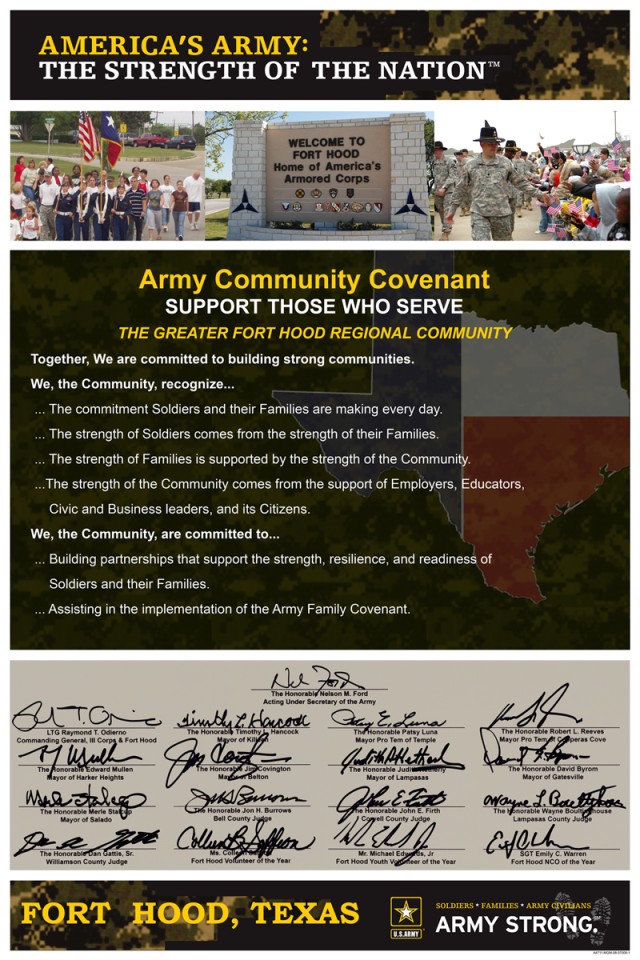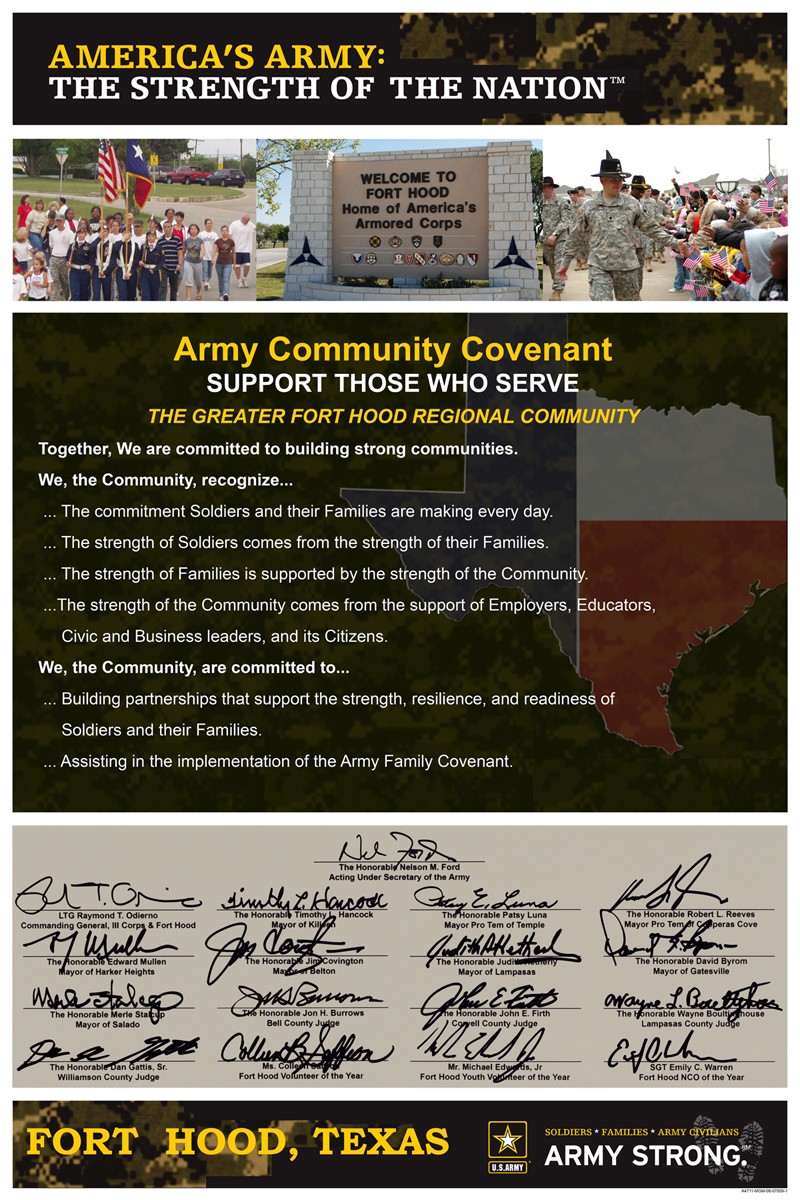FORT HOOD, Texas -- Army Community Services and the Directorate of Family Morale, Welfare and Recreation are not the only agencies representing the Army Family CovenantAca,!a,,cs commitment to helping Families and bettering their quality of life and services.
Those service providers are only part of the ArmyAca,!a,,cs reinvigorated commitment.
Many quality of life issues with housing and health care have been enhanced because of the Army Family Covenant.
The covenant commits to improving Family readiness by Aca,!A"improving Soldier and Family housing.Aca,!A?
Overall, Fort Hood Family Housing is some of the best in the Army. Fort Hood was one of the first to privatize on-post housing. But, some of the housing units are outdated and need replaced.
At the TV Town Hall two weeks, III Corps and Fort Hood commander Lt. Gen. Rick Lynch addressed substandard housing on post and said he continues to bring the issue to the forefront to those who control the money needed to fix housing in disrepair.
While many of the post housing areas have been upgraded, the general is still concerned about those that have not. During a recent visit to Fort Hood, Lynch took Texas Senator Kay Bailey Hutchison to the substandard housing areas to illustrate his concerns.
Fort Hood Family Housing has a 50-year development plan that began in 2001, Jennyth Peterson with Fort HoodAca,!a,,cs Directorate of Public Works, said.
Funding is the issue since there are 5,900 homes on-post and renovations and new construction receive only the marginal funds remaining from the rent after operation costs, maintenance costs, insurance, utility costs and loan payments.
There are repair, replacement and renovation projects planned in various housing villages throughout the 50-year plan. Current renovation projects include new roofs in Comanche III, new fencing in Comanche III, energy efficient windows in Comanche II, and the replacement of storage room doors in Pershing, Peterson said. Future plans include additional roofing projects in Pershing Park.
That money could come, in part, from the Army Family Covenant as part of the ArmyAca,!a,,cs commitment to improve Soldier and Family housing.
The covenant also commits to Aca,!A"Improving accessibility and quality of healthcare.Aca,!A?
During the same TV Town Hall, Carl R. Darnall Army Medical Center commander Col. Casper R. Jones noted an additional $7 million spent over the last year to hire additional primary care providers.
The increased staff has amounted to an additional 19 providers in the emergency room, a triage and treatment area to quickly provide care, and 24-hour behavioral health care in the ER, as well as additional appointment availability.
Aca,!A"WeAca,!a,,cve been able to add extended hours clinics on Mondays, Tuesdays, Thursdays, Saturdays and Sundays,Aca,!A? Jones said. Aca,!A"During the week, those clinics run until (8 a.m.). During the weekends, those clinics run from 8-10 a.m. and (1-4 p.m.) thatAca,!a,,cs additional appointments,Aca,!A? Jones said.
With the funding available, Fort Hood leadership is listening to FamiliesAca,!a,,c concerns and taking proactive steps to institute the commitments of the covenant.
When 4th Infantry Division commander Maj. Gen. Jeffery Hammond and Col. Bill Hill, Fort Hood Garrison Commander, joined FORSCOM commander Gen. Charles Campbell in signing the covenant in front of Army Families and civic leaders at last yearAca,!a,,cs ceremony, they made promises to Army Families.
Aca,!A"Army Families are being challenged like never before,Aca,!A? Hill said. Aca,!A"New needs are emerging.Aca,!A?
The leaders agreed the old systems were not designed for an Army at war and were ill-equipped to deal with the stresses Army Families are facing during the Global War on Terrorism.
Aca,!A"We know the Family support systems from before (Sept. 11, 2001) designed for a peacetime Army are no longer adequate for an Army at war,Aca,!A? Campbell said at the ceremony last year.
Aca,!A"Our support to Army Families must adapt to this new normal,Aca,!A? Campbell added.
With longer and more rapid deployment cycles, Families have had to adjust to meet this new normal. Leaders acknowledge the stresses and challenges Families face and are working to provide more quality services as well as better access to those services.
Armywide in the last few years, almost 80,000 housing units on 36 installations have been improved and 40 new daycare centers have been built with another 22 planned.
The Army also spent $50 million to hire new healthcare providers and is working to help Army spouses receive priority for civil service jobs. There also are now Family readiness support assistants at the battalion level.
At Fort Hood, the child development centers have doubled their available respite care hours and two Soldier and Family readiness centers have opened. In addition, the installation expanded its scope of care to Families with new spouse programs and reintegration programs, adjusted the approach to health care and worked to cut down wait times for medical appointments. And the enhancements are planned to continue.


Social Sharing